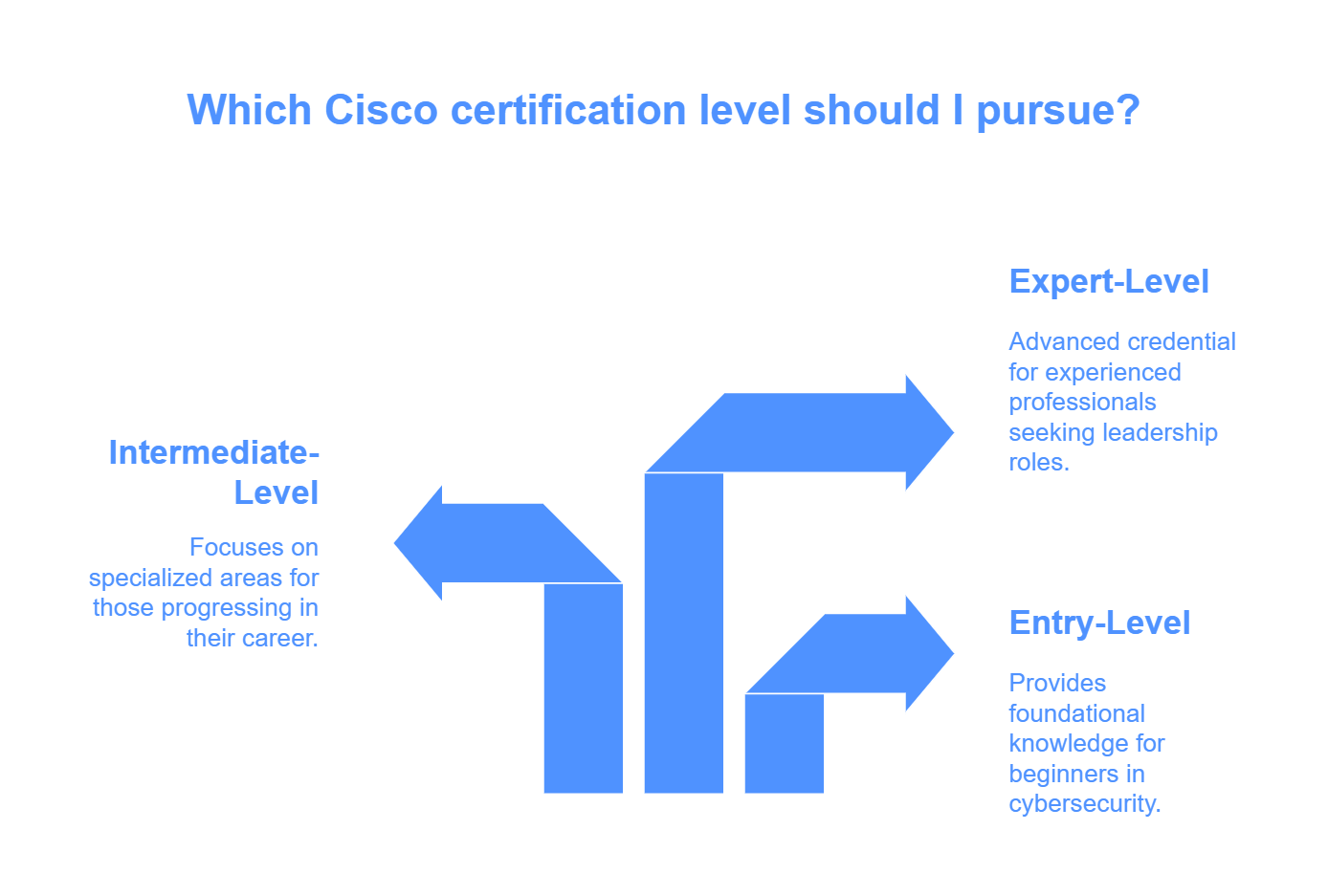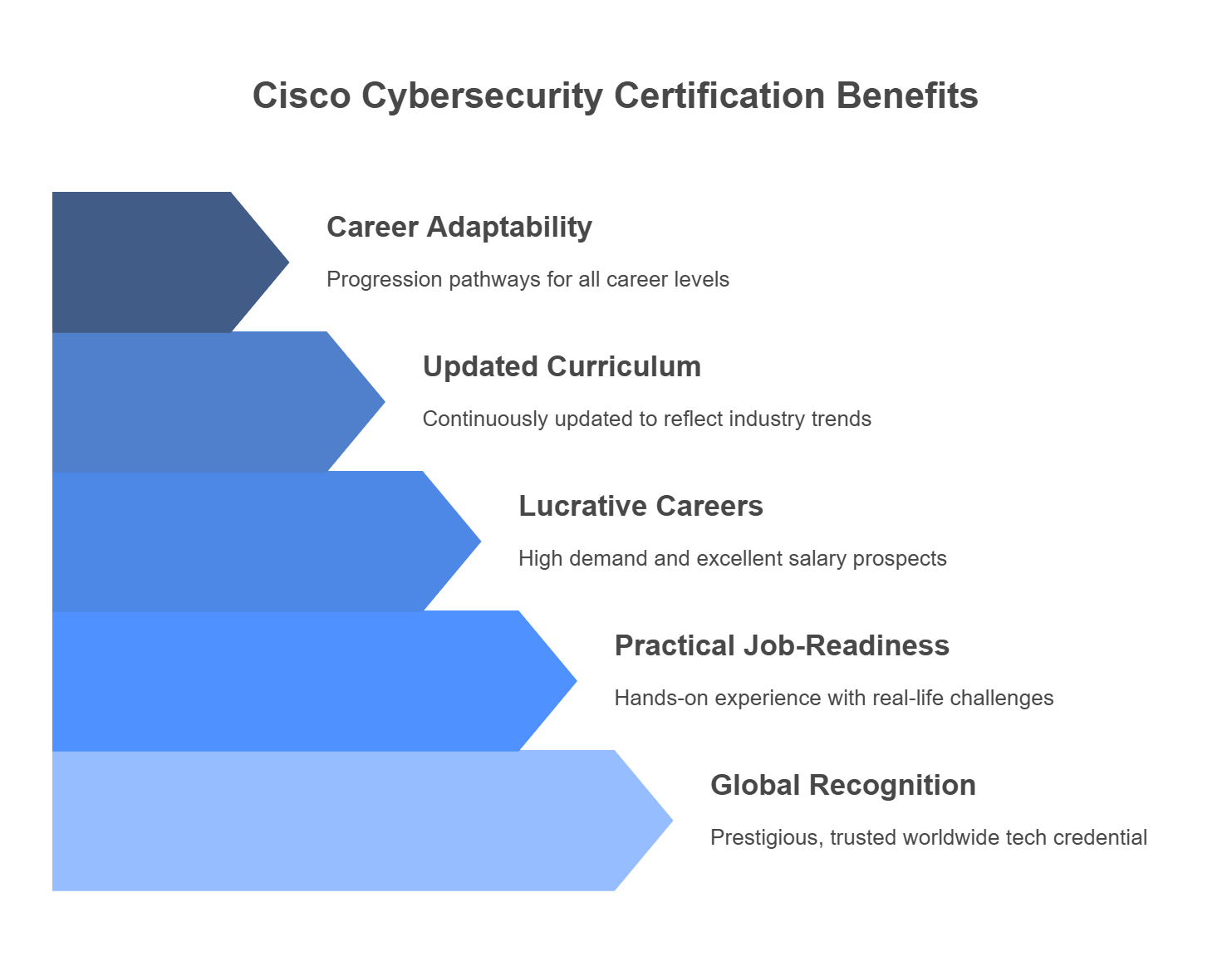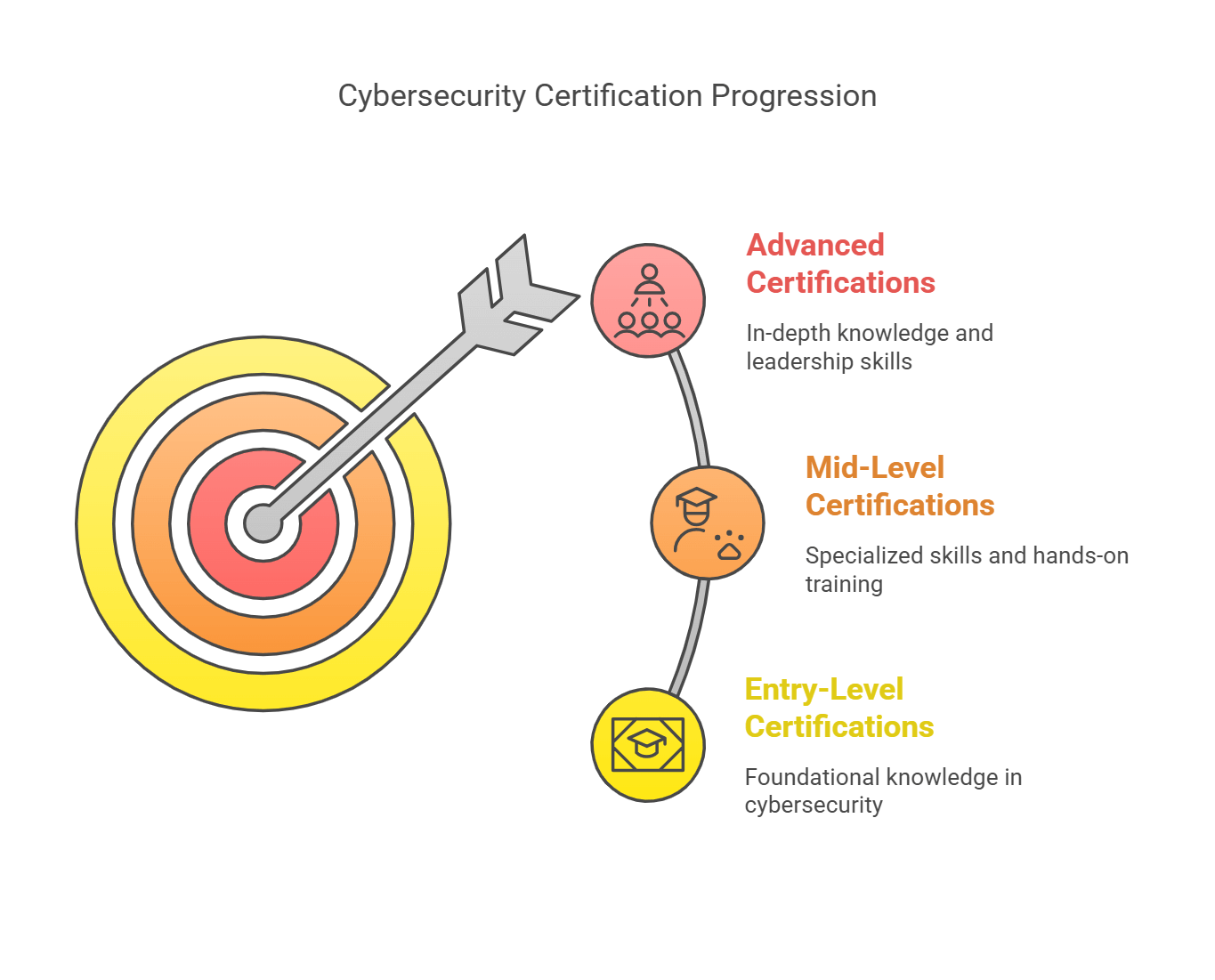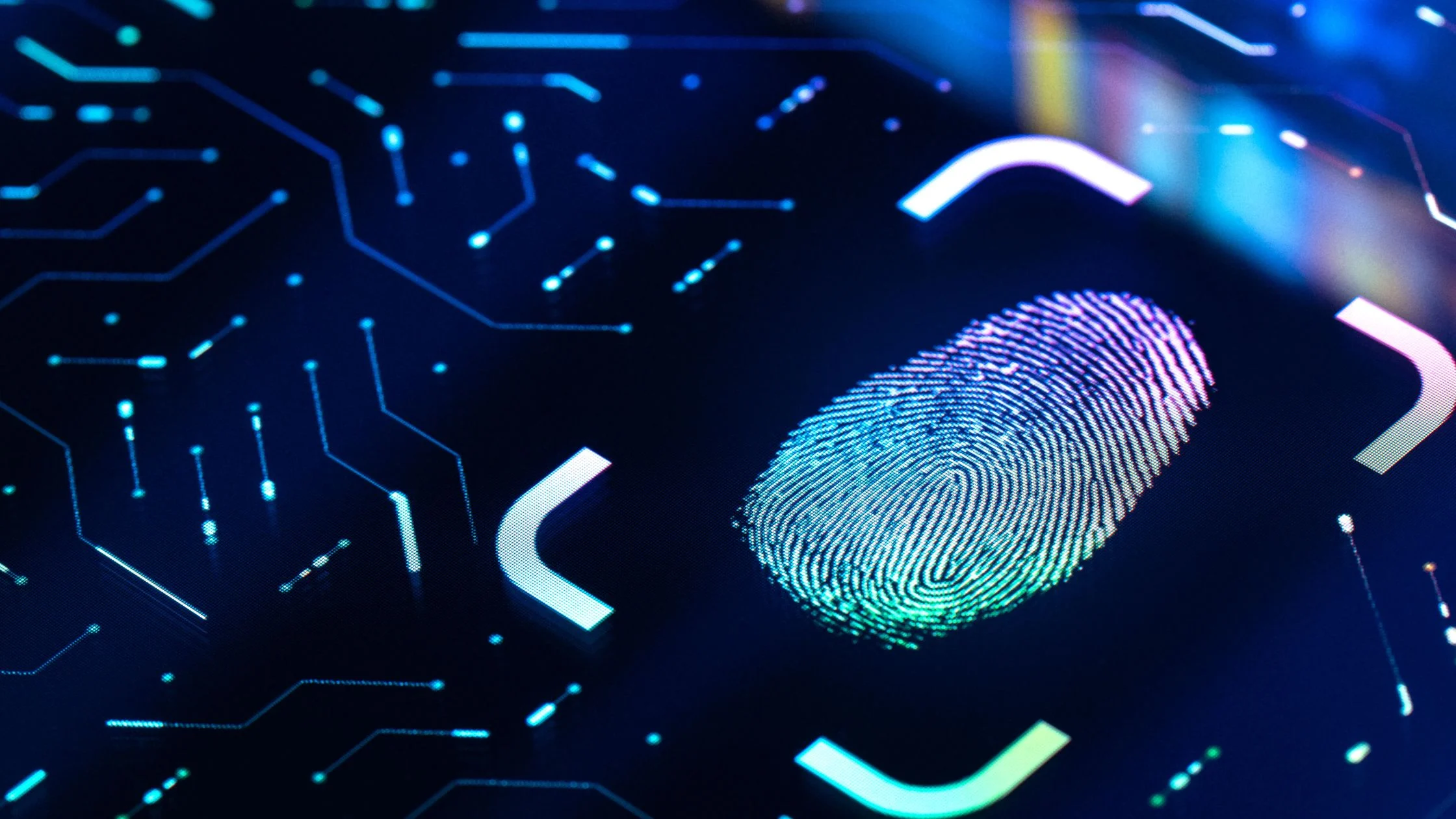Table of Contents
The world today is more interconnected than ever before, but with this connectivity comes an increasing number of vulnerabilities. As businesses and individuals continue to rely on digital platforms, cyberattacks grow in sophistication and frequency, leading to devastating consequences for organizations that aren’t adequately protected. As a result, the demand for skilled cybersecurity professionals has skyrocketed, presenting a massive opportunity for tech enthusiasts looking to specialize in this critical field.
One of the most recognized and respected credentials in the cybersecurity industry is the Cisco Cybersecurity Certification. Whether you’re entering the cybersecurity field or aiming to enhance your existing expertise, Cisco certifications provide a trusted pathway to career advancement. These certifications equip professionals with the hands-on experience, global recognition, and technical know-how needed to protect businesses from evolving threats. If you’re looking for a Cybersecurity Certification Course Free, several platforms offer valuable resources to help you build a strong foundation in cybersecurity without financial barriers.
In this guide, we’ll explore everything you need to know about Cisco cybersecurity certifications—from the benefits and challenges to strategic preparation tips. We’ll also highlight how partnering with platforms like ACSMI Certification, which offers a comprehensive library of over 400 modules, can enrich your learning experience.
What is Cisco Cybersecurity Certification?
A Cisco Cybersecurity Certification is a credential designed to validate a professional’s knowledge and skills in various areas of cybersecurity. This includes securing networks, managing threat responses, implementing security architectures, and much more. Cisco provides a structured certification program that covers all levels of expertise, from entry-level to expert, ensuring that learners at any stage of their cybersecurity careers have a clear growth path.
Cisco certifications are highly respected in the cybersecurity industry, and they are tailored to meet the needs of professionals who are looking to gain specialized knowledge and practical skills in real-world cybersecurity challenges.
Cisco Certification Levels
Cisco certifications are divided into three levels, each designed to meet the needs of professionals at different stages in their careers. Whether you’re just beginning or already an experienced professional, Cisco’s certification structure offers a clear pathway to success:

Entry-Level Certifications
For individuals just starting in cybersecurity, entry-level certifications like the CyberOps Associate provide foundational knowledge in security principles and basic threat detection. These certifications introduce learners to the basic building blocks of cybersecurity, such as network security, system administration, and threat response.
Intermediate-Level Certifications
As you progress in your career, intermediate certifications like the Cisco Certified Network Security Specialist (CCNS) become essential. These certifications focus on more specialized areas of cybersecurity, such as secure network configurations, endpoint security, and forensic analysis. These certifications require deeper knowledge of cybersecurity concepts and techniques.
Expert-Level Certifications
The pinnacle of Cisco certifications is the CCIE Security (Cisco Certified Internetwork Expert Security), which is one of the most advanced and prestigious credentials in the field. This certification focuses on end-to-end security solutions, troubleshooting complex security issues, and implementing robust security architectures for large-scale networks. It is typically pursued by experienced professionals looking to assume leadership roles in cybersecurity.
Cisco’s hands-on, job-oriented approach ensures that their certifications don’t just teach theory but also prepare you to solve real-world cybersecurity problems.
Why Choose Cisco Cybersecurity Certification?
Earning a Cisco Cybersecurity Certification Philippines offers numerous benefits that extend across career opportunities, skill development, and financial rewards. Let’s explore why this certification is a valuable investment:

1. Global Recognition
Cisco certifications are among the most prestigious credentials in the tech industry, recognized worldwide. Companies trust Cisco-certified professionals for their proven expertise in applying world-class cybersecurity practices. This global recognition gives you an edge in the job market and makes you a sought-after professional across industries.
2. Job-Readiness with Practical Labs
Cisco places a heavy emphasis on practical, hands-on experience, ensuring that learners are not just “certified” on paper but are also capable of handling real-life cybersecurity challenges. Through labs and simulations, you’ll apply your knowledge in scenarios that mirror actual security breaches and other security-related issues.
3. Pathway to Lucrative Career Roles
The demand for cybersecurity professionals is at an all-time high. Cisco-certified professionals enjoy excellent employability prospects and higher salary scales. For example, a Cisco Certified CyberOps Associate can expect to earn between $75,000 and $95,000 annually, while more advanced certifications like CCIE Security can lead to starting salaries of $150,000 or more.
4. Updated Curriculum Aligned to Industry Trends
Cisco ensures that its curriculum is continuously updated to reflect the latest trends in cybersecurity. From securing multi-cloud environments to addressing AI-driven cybersecurity threats, Cisco keeps its certifications relevant and in line with the rapidly evolving cybersecurity landscape.
5. Adaptability Across Career Stages
Whether you’re just starting out or managing enterprise security teams, Cisco certifications offer something for every career level. The clear progression pathways make it easy to grow from entry-level roles to mid- and high-level cybersecurity positions.
Challenges in Attaining Cisco Cybersecurity Certification
While earning a Cisco Cybersecurity Certification is highly rewarding, it does come with its challenges. Here are a few to consider:

1. Intensive Study Requirements
Cisco’s certifications, especially those at the expert level (like CCIE Security), require extensive study and commitment. The amount of material covered is substantial, and success depends on regular study, practice, and discipline. While the certification is valuable, the preparation process can be time-consuming and demanding.
2. Rigorous Exams
Cisco exams are known for their rigor. Not only do they test your knowledge, but they also require you to apply concepts in simulated environments. These exams assess your practical problem-solving abilities, making it crucial to master both theoretical knowledge and hands-on skills.
3. Language and Jargon
Cisco’s materials often use industry-standard terminology and jargon that can be overwhelming for beginners. To mitigate this, it’s advisable to supplement your learning with beginner-friendly resources, such as those offered by ACSMI Certification, which can help simplify complex concepts and make them easier to understand.
4. Cost
While Cisco certifications offer long-term value, the upfront costs can be significant, especially for more advanced certifications like CCIE Security. While the investment is often worth it, learners should be prepared for the financial commitment. Utilizing free or cost-effective study resources can help alleviate some of these costs.
How to Make the Most of Cisco Certification with ACSMI
ACSMI offers dynamic, comprehensive learning resources that complement your Cisco Cybersecurity Certification preparation. With over 400 modules covering a wide range of cybersecurity topics, ACSMI can help you gain additional tools and hands-on experience to excel in your certification exams. Here’s how ACSMI enhances your learning process:
Extended Training Coverage
While Cisco focuses on specific technologies, ACSMI expands its coverage to broader areas like AI threat prevention, ethical hacking, and blockchain security. This well-rounded approach ensures that you are not just prepared for Cisco exams but also equipped to handle cutting-edge cybersecurity issues.
Real-World Simulation Labs
ACSMI’s platform provides simulation labs that replicate real-world security breaches. These hands-on exercises give you the practical experience necessary to apply your theoretical knowledge to actual cybersecurity challenges.
Custom Learning Paths
ACSMI offers tailored learning paths based on your career goals. Whether you’re preparing for an entry-level exam or aiming for more advanced certifications, ACSMI helps structure your learning process to fit your objectives.
Pairing Cisco certifications with ACSMI resources creates a powerful combination that will not only prepare you for exams but also give you the skills and expertise needed to thrive in the cybersecurity industry.
Career Impact of Cisco Cybersecurity Certification
A Cisco Cybersecurity Certification can significantly boost your career prospects, no matter where you are in your cybersecurity journey. Here’s how Cisco certifications align with different experience levels:
Entry-Level (0-3 Years of Experience)
For individuals starting out, certifications like CyberOps Associate help you build foundational knowledge in threat analysis and network security. These certifications open doors to roles like SOC (Security Operations Center) Analyst and Network Administrator.
Mid-Level (3-7 Years of Experience)
Intermediate certifications prepare professionals for specialized roles like Penetration Tester, Security Consultant, or Security Architect. These roles require more in-depth knowledge of network configurations, forensic analysis, and threat mitigation.
Leadership and Expert Roles (8+ Years of Experience)
Advanced certifications like CCIE Security are ideal for seasoned professionals seeking leadership positions. These certifications pave the way for roles such as Chief Information Security Officer (CISO), Network Architect, or Cybersecurity Director, where you’ll oversee entire security infrastructures and guide enterprise-wide security strategies.
Final Thoughts
Earning a Cisco Cybersecurity Certification is more than just a credential—it’s a powerful tool that helps you unlock new career opportunities, increase your earning potential, and stay competitive in a rapidly evolving industry. Whether you’re a beginner starting with CyberOps Associate or an expert pursuing CCIE Security, Cisco’s certifications offer a comprehensive learning experience that is second to none.
By pairing Cisco certifications with additional resources like ACSMI Certification, you can gain the hands-on experience, practical knowledge, and industry recognition needed to thrive in the cybersecurity field. Start your Cisco certification journey today, and take the next step in your career development!
FAQs on Cisco Cybersecurity Certification
1. How long does it take to earn a Cisco Cybersecurity Certification?
Entry-level certifications typically take 3-6 months of preparation, while expert-level certifications like CCIE may require over a year.
2. How often do Cisco certifications need renewal?
Most Cisco certifications require renewal every three years through continuing education or recertification exams.
3. Why choose Cisco certifications over vendor-neutral ones?
Cisco certifications offer specialized expertise in Cisco technologies, which are widely used in network-heavy roles. Vendor-neutral certifications like CISSP provide broader knowledge across multiple platforms and systems.
4. What makes ACSMI a good partner for Cisco preparation?
ACSMI provides over 400 modules, hands-on labs, and up-to-date materials that complement Cisco concepts and improve your exam readiness.
5. What salary can I expect after getting a Cisco Cybersecurity Certification?
Salaries can vary, but entry-level positions typically start around $75,000 annually, while advanced roles such as CCIE Security can lead to salaries well into the six figures.

Leave a Reply